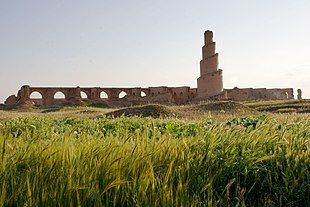Abu Dulaf Mosque
| Abu Dulaf Mosque | |
|---|---|
Arabic: جامع أبو دلف | |
 The spiral minaret of the Abu Dulaf Mosque | |
| Religion | |
| Affiliation | Islam |
| Rite | Sunni |
| Ecclesiastical or organisational status | Mosque |
| Status | Active |
| Location | |
| Location | near Samarra, Iraq |
| Country | Samarra, Abbasid Caliphate, now Iraq |
Location in Iraq | |
| Geographic coordinates | 34°21′40″N 43°48′08″E / 34.3611°N 43.8022°E |
| Architecture | |
| Type | Islamic architecture (Abbasid architecture) |
| Founder | Caliph Al-Mutawakkil |
| Date established | 859 CE |
| Specifications | |
| Interior area | 46,800 square metres (504,000 sq ft) |
| Minaret(s) | 1 |
| Minaret height | 32 metres (105 ft) |
Abu Dulaf Mosque (Arabic: جامع أبو دلف) is an ancient historic mosque located approximately 15 kilometres (9.3 mi) north of Samarra in the Saladin Governorate,[1] Iraq. The mosque was commissioned by the 10th Abbasid Caliph Al-Mutawakkil in 859.[2]
The archeological mosque, along with the Great Mosque of Samarra, represent a unique example of the planning, capacity, construction, and artistic in Islamic architecture and mosques in the Abbasid Caliphate, considered one of the finest. Their large dimensions and unique spiral minarets, these mosques demonstrate the pride and political and religious strength that correspond with the strength and power of the caliphate at that time. Even after the abandonment of the mosque by the Caliphate, the mosque remained partially preserved with some damages caused mainly by ploughing and cultivation. The mosque, along with the archeological city of Samarra, are a part of the UNESCO World Heritage Convention.[3]
Description
[edit]
The mosque is rectangular shaped, and consisted of the open air sahn surrounded by the corridors with the qibla corridor being the biggest of them. The mosque is among the largest mosques in the world measured by area size 37,500 square metres (404,000 sq ft), reaching 157 meters width and 240 meters length. The iconic spiral minaret which resembles the renowned Malwiya of the Great Mosque of Samarra is located at the northern side. The unique design of the minaret is said to be inspired by the similar structure in Firuzabad,[2] while others believe the minaret's unique spiral design is derived from the architecture of the Mesopotamian ziggurats (modern day Iraq).[4]
The minaret reaches 32 metres (105 ft) and standing on a square base.[5] The mosque also has extra arcades added to its courtyard indicating that the interior of the mosque couldn't accommodate the masses during Friday prayers. The Mosque of Ibn Tulun in Cairo has similar architecture to the Abu Dulaf Mosque, as well as other mosques in Samarra at the time, if not a smaller replica of said mosque.[6]
See also
[edit]References
[edit]- ^ جامع ابو دلف. Masajed Iraq. Retrieved January 4, 2018.
- ^ a b ارجح, اکرم. "جامع کبیر". rch.ac.ir (in Persian). دانشنامه جهان اسلام. Retrieved 21 May 2017.
- ^ Centre, UNESCO World Heritage. "Samarra Archaeological City". UNESCO World Heritage Centre. Retrieved 2023-12-19.
- ^ Henri, Stierlin (1977). Comprendre l'Architecture Universelle 2. Fribourg, Switzerland: Office du Livre. p. 347.
Great mosque, Samarra, was built during the caliphate of al-Mutawakkil. It is the largest mosque in the world. Built entirely of brick within a wall flanked with towers, it has a 55 m high minaret with a spiral ramp that recalls the ziggurats of Mesopotamia
- ^ Abu Dulaf Mosque and Minaret Archived 2015-11-12 at the Wayback Machine. Cultural Property Training Resource. Retrieved January 4, 2018.
- ^ O'Kane, Bernard (2012-12-15). The Civilization of the Islamic World. The Rosen Publishing Group, Inc. ISBN 978-1-4488-8509-1.

